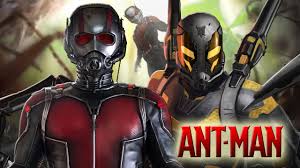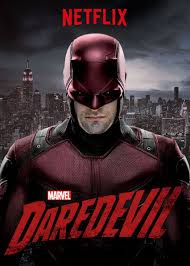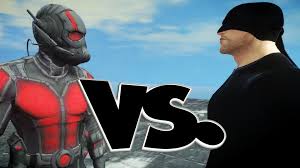(As a bit of light-hearted reading before the issuance of the Holy Father’s Apostolic Letter later today, here are some thoughts on two superheroes, such as they are. Editor).
Yes, I must admit, I did watch Ant-Man, in two instalments, for a I had to sort of motivate myself to finish it. The campy film was better than it might have been, but worse also. Carried along by the charisma of its male lead, the movie has a child-likeness about it, refreshing in the age of jaded superheroes (and heroes in general).
Need I discuss the physical impossibilities of the whole premise? Michael Douglas’ character, Hank Pym (I was surprised to see him, sort of thinking that original Wall Street-guy was nearly dead). Anyway, Pym is the inventor of the ‘technology’ of the ant-suit, based on his discovery of a way to shrink creatures to miniscule size, while maintaining their strength and speed, by reducing the ‘space between their atoms’. The problem is that such creatures would still have the same mass, and thus be just as heavy. Ant-Man would not be as nimble as he is, and would wreck things as he stomped around.
There are, of course, also the insurmountable physiological problems with creatures adapted to large-scale life becoming the size of insects. Even back in Galileo’s day, they realized that surface area and volume increase and decrease at different rates, which is why insects have exoskeletons, while large mammals have endoskeletons. Not just that, but at a cert ain size, the lungs and heart would cease to function, to say nothing of the brain.
ain size, the lungs and heart would cease to function, to say nothing of the brain.
But why bother with all the science stuff? It is a cartoonish movie, with a few humorous bits to move the plot along, but also with some rather garish violence, unsuitable for the young (and old, for that matter), such as when the villain uses a defective ‘shrinking gun’ on someone, turning him into a reddish blob of bloody tissue, which he wipes up and flushes down the loo. I don’t know, but I found that quite disturbing for some reason.
My main concern was with the subplot of Scott’s (the Ant-Man’s real name) domestic life, such as it is. He apparently abandoned his wife and young daughter to commit a Robin Hood-esque heist, for which he spends a number of years in the slammer. When he gets out, his finds his wife shacked up with a middle-aged cop, with her seven-year girl old in tow. It was a bit embarrassing to see these two middle-aged men, Scott and the cop, vie for the affection of this young girl through the film, all the while her Mum committing open adultery, and her father falling in love with Hank Pym’s daughter. No one seems desirous of any further children, just enjoying themselves. Is it just me, or am I weird in thinking that this messed-up moral situation, with all the ‘adults’ in her life seeking juvenile pleasure, would do far more harm to the young girl-to-be-rescued, than anything the villainous ‘Yellow Jacket’ , arch-enemy of Ant-Man, could ever do?
So, ho-hum, she was saved, only to face a world where growing up normal is all but impossible. But, then again, there are lots of little girls in her situation, and no one seems able to save them, Ant-suit or not.
 What of the Netflix Daredevil series? Again, I will admit that I watched the first season, being a fan of the comics when I was of the age to read such things, now, yes, of the age to watch them. Like Batman, the character always intrigued me, being a ‘self-made’ superhero, relying by and large upon his own developed skills, with a bit of help from heightened senses. Also, like Batman, Daredevil was vulnerable, and his Catholicism, his struggles with his conscience and the morality of his actions, added to the drama.
What of the Netflix Daredevil series? Again, I will admit that I watched the first season, being a fan of the comics when I was of the age to read such things, now, yes, of the age to watch them. Like Batman, the character always intrigued me, being a ‘self-made’ superhero, relying by and large upon his own developed skills, with a bit of help from heightened senses. Also, like Batman, Daredevil was vulnerable, and his Catholicism, his struggles with his conscience and the morality of his actions, added to the drama.
They try to bring this out in the series, with some limited success. Hollywood has little idea of the complexities and nuances of Catholicism, nor of its complementary stark lines of evil and good. Matt Murdoch (Daredevil’s real name) is a New York lawyer by day, vigilante by night. He has certain moral lines he will not cross, especially killing anyone, which seems odd, for he will bash, crush and wreak havoc on people, often presented in gory and voyeuristic violence (more vivid when done by the ‘bad guys’). One must wonder that the Daredevil is at the very least causing potentially-lethal harm, itself an evil, unless done strictly in a proportionate manner in self-defense.
Matt is portrayed as Catholic who does not seem to live any sort of regular religious life, a familiar theme, even though he is shown going into his local church, struggling with his conscience, and speaking with his priest now and again. This man of the cloth is presented with more masculinity and moral certainty than most in films. However, he is still weak and wavering, offering often vague advice, allowing Matt to continue with his life of ambiguous and, I would argue, immoral vigilantism.
That allows the comic-book show to continue, but I am glad to see that they at least raise moral questions in this series, leading the jaded viewers, I hope, perhaps to begin the process of asking questions about themselves, and life in general, in however inchoate a Socratic fashion. What indeed is the proper response to violence, especially as such violence creeps ever closer to our own milieu?
As we question, we may at least hope, along with Daredevil, that some good comes out of the evil. The problem with which Daredevil must wrestle, pun intended, lies in doing the evil in the first place, and becoming as dark, brutal and coarse as those against whom he fights.

